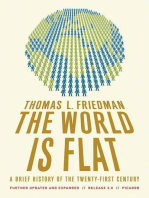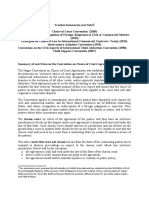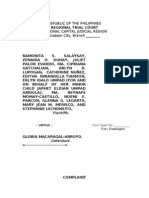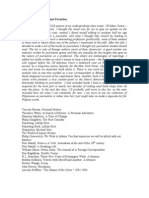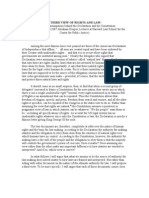Centerlaw Statement On FIFO
Centerlaw Statement On FIFO
Uploaded by
pinoydooyeweerdianCopyright:
Available Formats
Centerlaw Statement On FIFO
Centerlaw Statement On FIFO
Uploaded by
pinoydooyeweerdianOriginal Title
Copyright
Available Formats
Share this document
Did you find this document useful?
Is this content inappropriate?
Copyright:
Available Formats
Centerlaw Statement On FIFO
Centerlaw Statement On FIFO
Uploaded by
pinoydooyeweerdianCopyright:
Available Formats
August 13, 2014
PRESS STATEMENT
Centerlaw: FFFJ Counsel Atty. Prima Jesusa Quinsayas is Guilty of Professional Negligence for her
Failure to Comprehend the First-In-First-Out Rule issued by the Supreme Court in the Ampatuan
Case
We at the Center for International Law (Centerlaw) express our grave alarm at the failure of
certain Private Prosecutors in the Maguindanao Massacre to comprehend a Supreme Court Resolution
which aims to speed up the trial of the multiple murder cases.
We refer specifically to what we have called by shorthand as the First-in-First-Our Rule (FIFO)
approved by the High Court for the Maguindanao Massacre trial.
For the record, it was Centerlaw through the Roque & Butuyan Law Offices that first proposed
FIFO. Simply, under FIFO, the court may already render judgment on the case of any accused over
whom all evidence for and against has already been heard.
The rationale is that the families of victims and the accused do not have to wait for the evidence
concerning 194 Accused to be heard by the court to achieve justice, which could take a long, long, long
time.
This is the fair rule respecting due process for both the families of the victim and the Accused.
Thus in the Motion for the adoption by the trial court of the First-in-First Our Rule we filed on
December 5, 2011 with the Regional Trial Court Branch 221trying the multiple murder cases, we said in
part:
At the time we filed the Motion, we said that of the 196 Accused
1
, only 93 have been arrested.
Of those arrested, only 64 had been arraigned. Meanwhile 70 witnesses have been heard in the last two
years of the trial as to the 64 Accused.
We noted in the Motion that under the ordinary rules of Philippine criminal procedure, the rule
is that an Accused is entitled to confront and cross-examine all his Accusers in court.
This would mean that there will be a constant recall to the witness stand of all witnesses
already presented each time there is a newly-arrested and newly-arraigned Accused. Assuming that
each of the 103 unarrested Accused claim the right to cross-examine their Accusers one by one, by this
measure, it would take a new series of cross-examinations at least 200 years to complete.
1
It is now only 194. One accused died in jail while another was released by the Court for lack of evidence against
him.
We said that none of the international tribunals of contemporary times even those for cases of
mass slaughter where the victims number by the hundreds, if not by the thousands has resorted to
wholesale prosecution of suspects.
Ultimately, such an approach works against the interests of justice, because of the protracted
litigation it entails that could take years and years and years and years and years and years and years
and years and years and years and years and years and years and years and years to wrap up, we said
in the 8-page motion.
For the record, other than by lawyers of the Center for International Law, the Motion proposing
the FIFO rule was also signed by the Deputy Regional Prosecutor Peter L. Medalle, Senior State
Assistant State Prosecutor Ma. Emilia L. Victorio, and Assistant State Prosecutor Susan Villanueva.
Atty. Nena Santos and Atty. Prima Quinsayas did not join the Motion.
The regional trial court hearing the case rejected the proposal, but the Supreme Court
subsequently adopted our proposal by issuing a Resolution to institutionalize it and to direct the trial
court to implement it.
In paragraphs (2) and (3) OF A.M, No.10-11-5-SC, the Supreme Court thus directed Branch 221
Presiding Judge Jocelyn Solis-Reyes
to hold, based on her discretion separate trials for the accused against whom the prosecution
contemplates no further evidence and thereby order such accused to present their evidence
and, accordingly, have the case submitted for decision with respect to them; provided, that this
paragraph is without prejudice to the application of rules on demurrer to evidence or other
modes of terminating a case in advance of a full trial.
to issue, when appropriate, separate decisions or resolutions for issues which are ripe for
resolution in any of the 58 cases being heard without waiting for the completion of the
presentation of the evidence for all the accused.
The Resolution of the Supreme Court on FIFO is very clear. It so disturbing and bothersome
that the counsel hired by the FFFJ Atty. Prima Quinsayas and Atty. Nena Santos for that matter fail
to understand the same.
Atty. Quinsayas equates FIFO with any of the following: (1) the accused first on trial would be
the one whose case would first be resolved (2) the Accused first to be arraigned to be the one whose
case would first be resolved, and (3) first to file a Petition for Bail would be the one whose case would
first be resolved
She said as much in two statements she signed and posted by the Center for Media Freedom
and Responsibility on the latters Ampatuan Trial Watch blog.
The first statement, posted on August 4, 2014 entitled, Private Prosecutor: resting in
evidence-in-chief does not reflect first in, first out principle said:
FFFJ legal counsel Prima JesusaQuinsayas said that resting in evidence-in-chief before the
resolution of bail petitions in the Ampatuan (Maguindanao) Massacre trial does not reflect the first in,
first out system. Quisanyas pointed out that the list of the 28 accused for whom state prosecutors
intend to rest their case in both the bail petitions and evidence-in-chief does not show that they
were among the first arrested, arraigned or the first to file a bail petition. (emphasis supplied).
The second statement, quoting Atty. Quinsayas and posted on August 8, 2014, and entitled
FFFJ counsel: clarifications on points raised by Atty. Harry Roque, said:
My understanding of the concept is that the accused first put on trial would be the one whose
case would first be resolved. But whether its First to be Arraigned, or First to File a Petition for Bail, the
list does not reflect any of those. Thus based on the list of the 28 accused, his reason for supporting the
partial resting in evidence-in-chief does not hold.
Obviously, Atty. Quinsayas totally misread what the Supreme Court said because in this second
statement, she also says that as for the guidelines issued by the Supreme Court for the criminal
proceedings of the massacre, the First In First Out as a term does not appear in the said guidelines.
Instead, the guidelines allow separate trials for the accused if so decided by the trial judge based on her
discretion.
Exactly. First-in-First-Out:
to hold, based on her discretion separate trials for the accused against whom the
prosecution contemplates no further evidence and thereby order such accused to present
their evidence and, accordingly, have the case submitted for decision with respect to them;
provided, that this paragraph is without prejudice to the application of rules on demurrer to
evidence or other modes of terminating a case in advance of a full trial.
to issue, when appropriate, separate decisions or resolutions for issues which are ripe for
resolution in any of the 58 cases being heard without waiting for the completion of the
presentation of the evidence for all the accused.*emphasis supplied+
Essentially, the High Court approved our proposal as contained in our Motion asking the trial court to
adopt the First-in-First Out Rule in the trial of the cases.
It is highly disturbing to us that Attorneys Santos and Quinsayas have seriously jeopardized the
prosecution of the case by their professionally negligent blunder.
In their gross error they have likewise arrogantly issued public statements that questioned
without any basis the integrity of the work of the panel of public prosecutors and their fellow private
prosecutors.
We call on organizations constituting the Freedom Fund for Filipino Journalists (FFFJ) to re-
examine the professional competence of Atty. Quinsayas. We even invite these organizations to refer
the interpretation of Atty. Quinsayas on the FIFO rule to their respective independent counsels for
objective evaluation purposes.
As we have shown, her pointed and unfounded attacks on the integrity of the work of the public
prosecutors betray her uncomprehending incompetence. Unwittingly, she has not only placed in
serious risk the case of the other victims being prosecuted by other private prosecutors, but also those
of victims being supported by the FFFJ as an organization.
H. Harry L. Roque, Jr.
Joel Ruiz Butuyan
Romel Regalado Bagares
Gilbert T. Andres
Ethel Avisado
GeepeeAceron Gonzales
You might also like
- The Subtle Art of Not Giving a F*ck: A Counterintuitive Approach to Living a Good LifeFrom EverandThe Subtle Art of Not Giving a F*ck: A Counterintuitive Approach to Living a Good LifeRating: 4 out of 5 stars4/5 (5982)
- The Gifts of Imperfection: Let Go of Who You Think You're Supposed to Be and Embrace Who You AreFrom EverandThe Gifts of Imperfection: Let Go of Who You Think You're Supposed to Be and Embrace Who You AreRating: 4 out of 5 stars4/5 (1112)
- Never Split the Difference: Negotiating As If Your Life Depended On ItFrom EverandNever Split the Difference: Negotiating As If Your Life Depended On ItRating: 4.5 out of 5 stars4.5/5 (898)
- Hidden Figures: The American Dream and the Untold Story of the Black Women Mathematicians Who Helped Win the Space RaceFrom EverandHidden Figures: The American Dream and the Untold Story of the Black Women Mathematicians Who Helped Win the Space RaceRating: 4 out of 5 stars4/5 (932)
- Grit: The Power of Passion and PerseveranceFrom EverandGrit: The Power of Passion and PerseveranceRating: 4 out of 5 stars4/5 (619)
- Shoe Dog: A Memoir by the Creator of NikeFrom EverandShoe Dog: A Memoir by the Creator of NikeRating: 4.5 out of 5 stars4.5/5 (546)
- The Hard Thing About Hard Things: Building a Business When There Are No Easy AnswersFrom EverandThe Hard Thing About Hard Things: Building a Business When There Are No Easy AnswersRating: 4.5 out of 5 stars4.5/5 (356)
- Her Body and Other Parties: StoriesFrom EverandHer Body and Other Parties: StoriesRating: 4 out of 5 stars4/5 (831)
- Elon Musk: Tesla, SpaceX, and the Quest for a Fantastic FutureFrom EverandElon Musk: Tesla, SpaceX, and the Quest for a Fantastic FutureRating: 4.5 out of 5 stars4.5/5 (476)
- The Emperor of All Maladies: A Biography of CancerFrom EverandThe Emperor of All Maladies: A Biography of CancerRating: 4.5 out of 5 stars4.5/5 (275)
- The Little Book of Hygge: Danish Secrets to Happy LivingFrom EverandThe Little Book of Hygge: Danish Secrets to Happy LivingRating: 3.5 out of 5 stars3.5/5 (424)
- The World Is Flat 3.0: A Brief History of the Twenty-first CenturyFrom EverandThe World Is Flat 3.0: A Brief History of the Twenty-first CenturyRating: 3.5 out of 5 stars3.5/5 (2272)
- The Yellow House: A Memoir (2019 National Book Award Winner)From EverandThe Yellow House: A Memoir (2019 National Book Award Winner)Rating: 4 out of 5 stars4/5 (99)
- Devil in the Grove: Thurgood Marshall, the Groveland Boys, and the Dawn of a New AmericaFrom EverandDevil in the Grove: Thurgood Marshall, the Groveland Boys, and the Dawn of a New AmericaRating: 4.5 out of 5 stars4.5/5 (270)
- The Sympathizer: A Novel (Pulitzer Prize for Fiction)From EverandThe Sympathizer: A Novel (Pulitzer Prize for Fiction)Rating: 4.5 out of 5 stars4.5/5 (125)
- Team of Rivals: The Political Genius of Abraham LincolnFrom EverandTeam of Rivals: The Political Genius of Abraham LincolnRating: 4.5 out of 5 stars4.5/5 (235)
- A Heartbreaking Work Of Staggering Genius: A Memoir Based on a True StoryFrom EverandA Heartbreaking Work Of Staggering Genius: A Memoir Based on a True StoryRating: 3.5 out of 5 stars3.5/5 (232)
- On Fire: The (Burning) Case for a Green New DealFrom EverandOn Fire: The (Burning) Case for a Green New DealRating: 4 out of 5 stars4/5 (75)
- "Reforming Public Theology: Two Kingdoms, or Two Cities?" Calvin Theological Journal 47 (2012) : 122-137.Document16 pages"Reforming Public Theology: Two Kingdoms, or Two Cities?" Calvin Theological Journal 47 (2012) : 122-137.James K.A. Smith100% (1)
- The Unwinding: An Inner History of the New AmericaFrom EverandThe Unwinding: An Inner History of the New AmericaRating: 4 out of 5 stars4/5 (45)
- Annual Report 2020Document200 pagesAnnual Report 2020pinoydooyeweerdianNo ratings yet
- Conventions Summaries Private International LawDocument16 pagesConventions Summaries Private International LawpinoydooyeweerdianNo ratings yet
- International Law&Domestic LawDocument37 pagesInternational Law&Domestic LawpinoydooyeweerdianNo ratings yet
- POSITION PAPER - Full Inclusion of The Indigenous People's in The Bangsamoro PDFDocument7 pagesPOSITION PAPER - Full Inclusion of The Indigenous People's in The Bangsamoro PDFMatet NorbeNo ratings yet
- Sydney Law School: Legal Studies Research Paper No. 16/37Document19 pagesSydney Law School: Legal Studies Research Paper No. 16/37pinoydooyeweerdianNo ratings yet
- Centerlaw Statement On FIFODocument5 pagesCenterlaw Statement On FIFOpinoydooyeweerdianNo ratings yet
- HIlbay Statement On Itu AbaDocument7 pagesHIlbay Statement On Itu AbapinoydooyeweerdianNo ratings yet
- Pestano Position PaperDocument54 pagesPestano Position Paperpinoydooyeweerdian89% (9)
- Petitioner,: en Banc, ManilaDocument14 pagesPetitioner,: en Banc, ManilapinoydooyeweerdianNo ratings yet
- Pestano Position PaperDocument54 pagesPestano Position Paperpinoydooyeweerdian89% (9)
- In Praise of A Poet of Tortured BeautyDocument6 pagesIn Praise of A Poet of Tortured BeautypinoydooyeweerdianNo ratings yet
- Complaint Gma FinalDocument13 pagesComplaint Gma FinalpinoydooyeweerdianNo ratings yet
- The PCEC and CorruptionDocument7 pagesThe PCEC and Corruptionpinoydooyeweerdian100% (1)
- Journalism ListDocument2 pagesJournalism ListpinoydooyeweerdianNo ratings yet
- The Problem of The "International Community"Document69 pagesThe Problem of The "International Community"pinoydooyeweerdianNo ratings yet
- A Third View of Rights and LawDocument13 pagesA Third View of Rights and LawpinoydooyeweerdianNo ratings yet




















